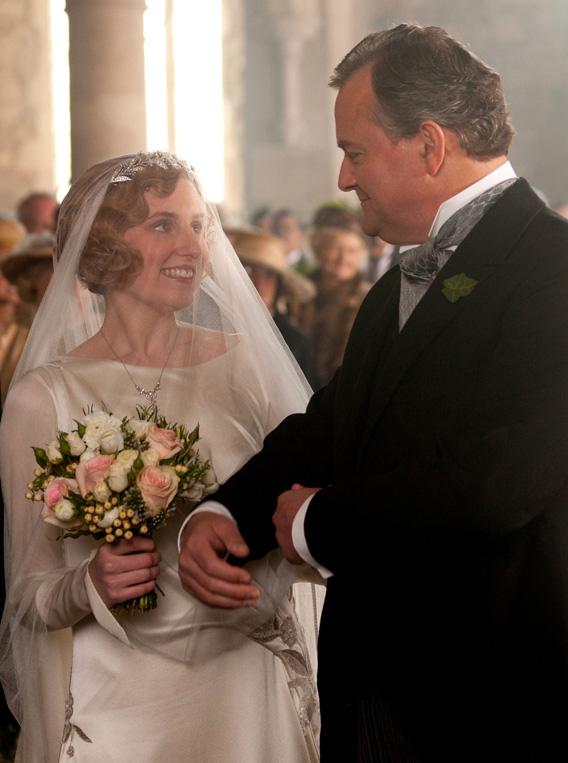Note: This post is full of spoilers about Season 3 of Downton Abbey.
It’s been almost a week since we said good-bye to Matthew Crawley’s presence at Downton Abbey and all I can say is thank God the season ended with him.
Sorry if that sounded crass. Yes, it was sad to see Crawley, played by Dan Stevens, bleeding, all alone, on the side of the road—mere minutes after holding his first child, no less. It was also a devastating blow to have Sybil (Jessica Brown Findlay) die so soon after delivering her firstborn. But these major developments underscore how what was once an addicting and compelling story of upstairs-downstairs politics that captured our attention from across the pond—and taught us all the nuances of an entail—quickly became “a rerun of a rerun of a rerun.” The recycled storylines included the played-out will-they-or-won’t-they between Matthew and Mary (Michelle Dockery)—we all knew they would!—and the less-than-compelling drama surrounding the manor’s future. Don’t even get me started about dreadfully boring and seemingly endless imprisonment of Bates (Brendan Coyle).
On Downton Abbey, a decade has passed since the sinking of the Titanic, and it’s time for the show to move beyond the eponymous manor. And the best way to do that is to focus on Downton’s most compelling character: Lady Edith, played by the underappreciated Laura Carmichael.
Now, before you go all googly eyes, think back to the best episode of Season 3, in which Sir Anthony Strallan (Robert Bathurst) left Edith at the altar. We may have been cheated out of yet another Downton wedding, but this time it was terribly sad—and also incredibly funny! Edith was marrying for love, but she also took into account the reality of her options post-World War I. The earnestness of her enthusiasm was a harbinger of what was to come. As Dan Kois and Seth Stevenson explain in Slate’s TV Club discussion: The actual scene in which she is left at the altar—with Strallan’s abrubt “I can’t do this”—is hilarious.
In the first two seasons Edith was a nebby joke, not just to viewers who cringed at her failed attempts at love, but to her family as well. The beautiful Carmichael was presented as a mousy shrew who didn’t know anything about men and was too vengeful and manipulative to endear herself to anyone in her family. In Season 1, her one-sided rivalry with Mary over Patrick—a man who played a pivotal role in the “Poor Edith” trope from Season 2—and even Matthew (you forgot about that, didn’t you!) showed her incompetence at love and her dependence on sweet yet daring Lady Sybil. She seemed pathetic, not sisterly.
But Season 3, in which both of her sisters were married and became, at some point, pregnant, gave Edith a chance to be endearing, emotional, and opinionated. She even got a newspaper column! She’s basically the Carrie Bradshaw for the mid-war set—and she has the hair to back it up. Her sexy—yes, I said sexy—and powerful new journalism job opens the door to a world of possibilities. She has an audience at Sketch and a married editor, Michael Gregson (Charles Edwards), who is in love with her.
What needs to happen: Edith moves in with Thomas (Rob James-Collier)—the vengeful gay footman who everyone loves to hate—in the city, and their story takes center stage. (Don’t worry: the dowager can still get in a good quip every now and then.)
If the new job and romance don’t do it for you and it’s economic commentary you crave: Have no fear! There has been much discussion about Edith’s essential “middle-classness” and how she represents the waste of the feudal economic system. As Willa Paskin explained in Salon, Mary is dedicated to the aristocracy and Sybil has essentially forsaken it, while Edith is caught between the two. She is always trying just a little too hard because everything is a bit more difficult for her. “On another show, a show more ideologically bourgeoisie, more ideologically liberal, all this effort and bad luck would make Edith a hero,” Paskin writes. “On Downton she is a punching bag.”
But she doesn’t have to be. She represents the future. And with the times finally a-changing, it’s time for Julian Fellowes to make use of that spinster.
